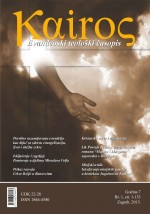Exclusion and Embrace: Reconciliation in the Works of Miroslav Volf
Exclusion and Embrace: Reconciliation in the Works of Miroslav Volf
Author(s): Corneliu ConstantineanuSubject(s): Christian Theology and Religion
Published by: Biblijski institut
Keywords: theology
Summary/Abstract: Among contemporary theologians, Miroslav Volf has written extensively on, and probably made the most significant contribution to, the topic of reconciliation. 1 The reason why Volf deserves special consideration is twofold. First, he has developed his theology of reconciliation in a context fraught with disturbing wars, and out of a deep concern for the social and political realities of the day; as such his writings are marked by a profound preoccupation with concrete questions and implications of the Christian faith for the contemporary world. Second, Volf has paid close attention to the biblical text and interacted with it throughout his work; thus, he addresses not only the question of the social meaning of reconciliation from various angles, but he also offers strong, biblical grounds for his theology. Dr. Miroslav Volf is the Henry B. Wright Professor of Theology at Yale Divinity School, and Director of the Yale Center for Faith and Culture. He is an influential Christian theologian, widely known for his works in systematic theology, moral ethics, reconciliation and peacemaking, and for his very active role in promoting a theology of forgiveness, non-violence and unity. Dr. Miroslav Volf was born in Osijek, Croatia and was educated at Evandeoski Teoloski Fakultet, Osijek (BA, summa cum laude); Fuller Theological Seminary (MA, summa cum laude); and University of Tübingen (Dr. theol., summa cum laude, and Dr. theol. habil., both under the supervision of Prof. Jürgen Moltmann).
Journal: Kairos: Evanđeoski teološki časopis
- Issue Year: 7/2013
- Issue No: 1
- Page Range: 35-54
- Page Count: 20
- Language: English

